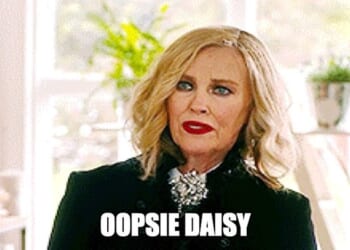A lot of quotations related to ‘waiting’ come from the religious world. Pastors, preachers, and philosophers all trying to explain why the process of waiting has as much meaning and purpose as what it is you are waiting for.
That’s a challenge these days because waiting is often seen as an unfortunate fundamental of human experience and in a world of instant gratification most of us just find it stressful, irritating and unsettling.
In the world of politics right now the Conservative party is a little restless. You can feel it in conversations, and mood. Restless isn’t the same as rebellious or mutinous it’s just, restless. There’s a fidgety anticipation and hunger for ‘something’ inspiring to happen without a consensus on what that is. As one MP put it to me:
“I just want the reassurance that whilst we do the necessary thinking about policy, we aren’t all sat around thinking what should we do in the meantime and instead, just get on with our jobs. I’m not convinced everyone is in a fully motivated head space at the moment. A lot of them are tired and pacing about not sure how to get stuck in”
In part the restlessness is because the party has been asked to show patience by, and with, the leader and the programme of policy development. While they wait there seems to be a range of things they’d like in that ‘meantime’ : an upturn in the polls, a win over Labour on a specific area, claiming another Ministerial scalp, a palpable victory to cheer, a punchy pithy electoral pitch to sell. These are all things I’ve heard expressed without a clear plan to make them happen.
We also predicted this month would be an awkward one for the party.
Of course the big mistake would be for MPs to substitute ‘something’ for ‘anything’ in their thinking. That old danger of “we should do something, this is something, therefore we should do it.” So far, whilst whispers are whispers, nobody seems convinced a change of personnel is the right answer. It’s more about tasking and being tasked than taking someone out.
However, never mind nature, politics and the media abhor a vacuum, and sometimes people outside the party, and sadly occasionally within, try to make things happen for their own advantage and agenda simply because it suits them. Patience here is really is a virtue. Then there are some who seem too willing to let the ‘existential threat’ narrative solidify and not see the risk of it becoming a self-fulfilling prophecy. Working together to make sure that doesn’t happen would seem a wiser response.
Kemi Badenoch and her team, whatever your views on them, have made a case that has logical merit, for not rushing to outline a full policy platform, yet. Despite the dreadful local election results and the loss of more hardworking councillors it is clear from Badenoch that the timeline on policy, despite our ConservativeHome survey demanding it be sped up, is not going to change. She outlined that this week on ConservativeHome.
The policy commissions are underway and doing what they’ve been asked to do, and whilst I stand by my view that a clock is running and the biggest test of the party’s and its leader’s fortunes will be the 2026 elections, there is much that could be done in the meantime that could boost those fortunes.
So how should the party behave while they are waiting?
There’s at least a recognition within the Parliamentary party that to varying degrees many have not yet adapted to being in opposition. I’d suggest similar is demonstrated within Labour’s ranks in not adapteding to being in Government – one factor in their shaky first year.
However more ‘behaving-like-a-hungry-opposition’ keen to take the fight to Labour couldn’t be a bad thing, and there’s plenty of targets to pick, and confidently strike. Dare I say it, in some departmental briefs we could do with seeing and hearing a lot more from some of the shadow cabinet than we currently do.
At the same time, there is plenty of room for the party to show a unity of purpose. Of course there have been differing views within the party for years, both in power and in opposition, but any new design of a ‘broad church’ has to recognise the difference between internal debate and dysfunctional factionalism. I’m not sure it has yet.
It’s true that pleas for ‘unity’ rarely do anything but highlight disunity, but this is an area where ‘show, not tell’ is the key. For as long as the party is not seen as having a unity of purpose, opponents will continue to paint it in the colours and tones that suit them best. Do things in a united way and those attacks don’t stick.
Andrew Gilligan’s excellent column on how Tony Blair preferred to attack opponents with language that fed a feeling about them has a resonance here. Tell voters the problem with Conservatives is they are always at each other’s throats, and they will believe it unless it becomes demonstrably untrue. Reform may be riding high right now, but Nigel Farage knows the ‘rats in a sack’ charge hurt his early days with UKIP. Tories know it’s a reason they were turfed out last July. They really have to show they’ve got that message and changed.
A further issue is that just by giving the impression of waiting for something to happen, it suggests to voters that you are worried that when it does happen it will not be what you wanted, or can get behind. It implies a nervy pre-judgement that, again, plays into opponents’ hands.
The biggest complaint that comes to me, from Conservatives at all levels of the party, is a feeling they don’t have a clear sense of the vision and mission being built into this party renewal.
The biggest frustration I get expressed from the top of the party is that they have been laying this out and some are choosing to pretend they haven’t. Whoever is right making an urgent and concerted effort to marry the two seems a ‘no brainer’.
The party has to avoid the Irish literary critic, Vivian Mercier’s description of the play Waiting for Godot which he said: “has achieved a theoretical impossibility – a play in which nothing happens, that yet keeps audiences glued to their seats.”
The party needs its audience, distracted too often by the attention being gifted to others, to be glued to their seats because Conservative things are happening. Waiting for a policy platform is a lot easier to bear if there’s positive activity that can fill the gap and gets a related positive effect.
I’d venture such activity would also relieve some of that uneasy restlessness that’s hanging about right now.



![‘It’s a Recipe for a Hundred Years of National Dominance’: Stephen Miller [WATCH]](https://www.right2024.com/wp-content/uploads/2025/05/Stephen-Miller-Completely-Obliterates-CNN-Host-Over-Her-Illegal-Immigration-350x250.jpg)

![Trump Posts Hilarious Pope Meme, Leftists Immediately Melt Down [WATCH]](https://www.right2024.com/wp-content/uploads/2025/05/Trump-Posts-Hilarious-Pope-Meme-Leftists-Immediately-Melt-Down-WATCH-350x250.jpg)

![Wild Road Rage Brawl Erupts in Milwaukee [WATCH]](https://www.right2024.com/wp-content/uploads/2025/05/Road-Rage-Turns-Violent-in-Oregon-Minivan-Mows-Down-Motorcyclist-350x250.jpg)


![Karoline Leavitt Calls for Jill Biden to Answer for Joe's Cognitive Decline Cover-Up [WATCH]](https://www.right2024.com/wp-content/uploads/2025/05/Karoline-Leavitt-Calls-for-Jill-Biden-to-Answer-for-Joes-350x250.jpg)
![Bessent Exposes Media Lies About April’s Stock Market Performance [WATCH]](https://www.right2024.com/wp-content/uploads/2025/04/Bessent-Exposes-Media-Lies-About-Aprils-Stock-Market-Performance-WATCH-350x250.jpg)





